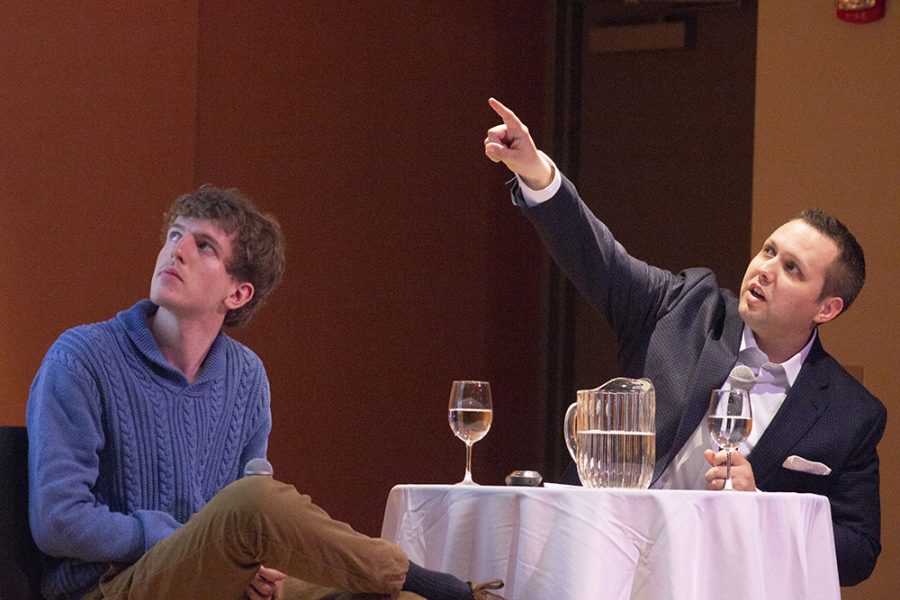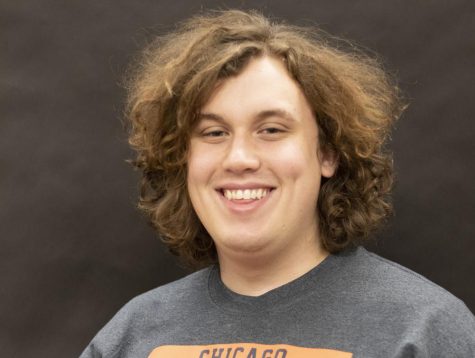Journalists talk covering Yingying Zhang murder trial
Ben Zigterman, reporter for the News-Gazette, and Joe Astrouski, journalism professor and former reporter for WAND-TV, refer to the projector of slides during their discussion detailing their personal experiences covering the kidnapping and murder trial of Yingying Zhang, a crop scientist from the University of Illinois, Wednesday at the Doudna Fine Arts Center’s Lecture Hall. During the discussion, Zigterman and Astrouski played a wired recording in which Brendt Christensen, the graduate student from the U of I who was convicted for Zhang’s abduction and murder, confesses to his ex-girlfriend (the person wearing the wire) the crime. In the recording, Christensen is heard saying that he choked Zhang for 10 minutes while she struggled. Zigterman said that recording helped expose how truly “debased” Christensen was.
February 20, 2020
Two reporters who covered the kidnapping and murder trial of University of Illinois student Yingying Zhang in 2017, Ben Zigterman of the News-Gazette and Eastern’s own journalism instructor Joe Astrouski, formerly of WAND-TV, held a discussion concerning their coverage of the kidnapping in the Doudna Fine Arts Center Wednesday evening.
U of I graduate student Brendt Christensen was sentenced to life in prison for abducting and murdering Zhang.
The story garnered local and nationwide attention.
“This was a high-profile case … People approached us on the street to ask us about this case. This is a case that garnered international attention, and I believe that our conversation tonight can be valuable and informative to all of us,” Astrouski said.
The two reporters’ discussion was intended not only to shed light on the killing, but also to educate students on covering high-profile events and using court records when researching.
“By making it easier for journalists to do their job, it also made it easier for the court to continue to function without being interrupted by reporters doing their work, and I think there’s a real lesson there for anyone who has to work with media, especially something of this high profile,” Astrouski said.
At first, it felt like any other reports of a kidnapping to seasoned reporters.
“I remember being a little skeptical because that first evening we were already hearing people throw around the word ‘kidnapping,’” Astrouski said.
Officials knew it was a kidnapping when camera footage of Christensen offering a ride to Zhang emerged.
Zigterman said that he had to adapt quickly from receiving news about the case to focusing his attention on writing his next story.
“You’re doing a little processing to think about what’s the most important from this section, but it is tough. After each day, I would go to usually like a local Starbucks and go through all my notes and write the whole story for the next day’s paper. That’s when I would think more about how to craft a clever or nice lead,” Zigterman said.
Zigterman learned a lot while covering this tragic event and researching subjects he never thought he would need to in his field of reporting.
“I cover business and city councils, not crime usually, so I just learned a lot about how the criminal processes work, and there’s not many death penalty trials in Illinois anymore, so I was calling up experts from across the country about the death penalty … A lot of it was practical — learning how to cover courts for the first time,” Zigterman said.
Zigterman hopes that the coverage and attention the case got can also be educational for those interested in pursuing journalism or media careers.
“I think it is an important case, and there are a lot of things I learned, and I was hoping journalism students could learn something from it, whether practical, whether big picture, or how to treat sensitive topics. Hopefully it helped,” Zigterman said.
Ryan Meyer can be reached at 581-2812 or at [email protected].




















































